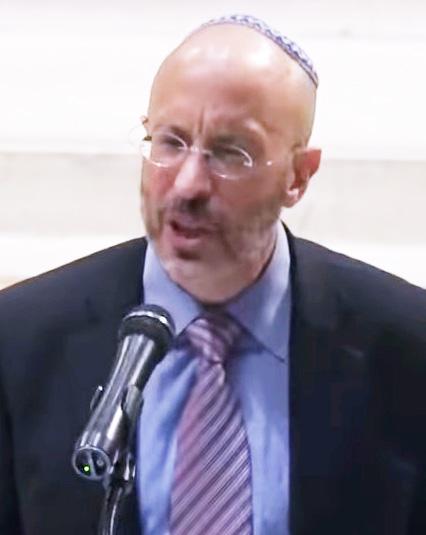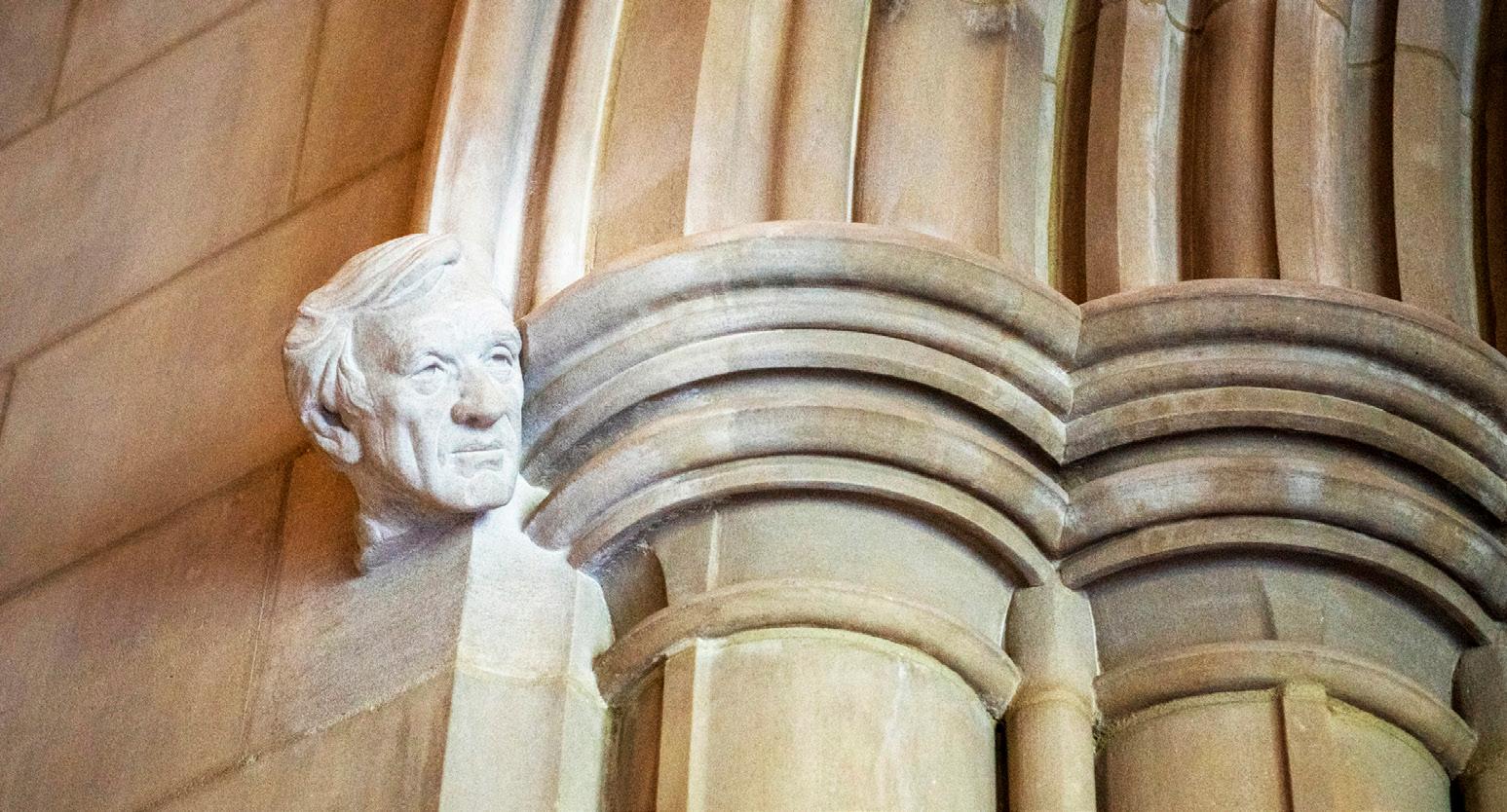
6 minute read
Conversation with
Honoring his father’s story, Elisha Weisel sees fighting antisemitism inextricably linked to Zionism
BY DMITRIY SHAPIRO
(JNS) The late Holocaust survivor, humanrights activist and Nobel laureate Elie Wiesel became the first modern Jew to have a bust of his face sculpted into the stonework of the Washington National Cathedral’s Human Rights Porch on Oct. 12, the last to be installed among four luminaries such as Mother Teresa and Rosa Parks.
A small, invitation-only audience attended an unveiling ceremony, where Wiesel was eulogized by distinguished individuals such as former Secretary of State Madeleine Albright; historian John Meacham; Rabbi Irving “Yitz” Greenberg, former chairman of the U.S. Holocaust Memorial Council; Mehnaz Afridi, director of the Holocaust, Genocide and Interfaith Education Center; Wai Wai Nu, founder of the Women’s Peace Network; and Rabbi David Saperstein, former Ambassador-atLarge for International Religious Freedom.
The Very Rev. Randolph Hollerith, dean of the cathedral, said that Wiesel’s bust was added because of his Jewish faith and not in spite of it.
“His global activism was rooted in and fueled by his belief in a just and merciful God,” said Hollerith.
The event’s last speaker was Wiesel’s only child and son, Elisha Wiesel, who thanked the cathedral for the honor and for recognizing his father as an observant Jew, even introducing a blemish into the bust to address biblical concerns against graven images.
Wiesel’s speech focused on his father’s Judaism, as well as support for the State of Israel, which he inextricably linked. In his speech, Wiesel, 49, asked questions of his father, who died in 2016, that illuminated those beliefs less often considered by the secular world.
“Today, you are recognized for speaking out against silence, but sometimes, I see people quote your admonition against silence as an excuse to scream at others with contempt, self-righteousness and anger. You never humiliated, ridiculed or screamed,” said Wiesel. “But what’s hardest for me is seeing those who read your books cry for the dead Jews, quote your protests against injustice, and then condemn in the most unforgiving terms the 6 million Jews living in Israel who refuse to ever again depend on the world to rescue them.
“No longer stateless and defenseless, these Jews, my brothers and sisters, face difficult circumstances and sometimes impossible choices. For this, they are held to a different standard than any other nation on earth by America’s elite.”
Wiesel, a successful businessman who has in recent years campaigned against anti-semitism and anti-Zionism, spoke to JNS recently about the experience, as well as antisemitism and Jewish unity.
The interview has been edited for clarity and brevity.
ELISHA WIESEL SPEAKING AT THE WASHINGTON NATIONAL CATHEDRAL ON OCT. 12, 2021. (SCREENSHOT)
PHOTO: ELIE WIESEL
THE BUST OF ELIE WIESEL WAS SCULPTED INTO THE STONEWORK OF THE WASHINGTON NATIONAL CATHEDRAL’S HUMAN RIGHTS PORCH. Q: How do you feel about your father being the first modern Jew in the cathedral to be honored? A: It’s a profound measure of respect, right? For me, the cathedral was presented to me as a multi-faith institution. I know that that’s not 100 percent right because it is primarily Episcopalian. But the thing that ultimately really moved me was that it’s an American institution, and my father was a passionately loyal and fervent citizen.
You have to remember, this country offered him citizenship when nobody else had.
When he arrived, he was still on a journalist visa, and he had been in a very bad traffic accident, and I think he was worried he’d missed the opportunity to renew his visa. He went to the customs office, and they said, “You know, you don’t have to renew your visa. You could become a citizen.”
Now, imagine that happening in this day and age. But that was a very powerful moment for my father. He really treasured being an American.
So to have him enshrined in such a powerful American institution is quite meaningful.

Q: Most people in your place would have probably spoken about what your father witnessed and his accomplishments, but you chose to ask questions of your father and society, and then linked his work closer to the Israel issue. Why did you decide to do that? A: I wanted to provide some balance. You know, one of the things that I was most worried about is this concept that others will tell the story of my father and who he was. But I know what was most important to my father—because he told me regularly—and that was to be a good Jew. And for him, being a good Jew, that was the ultimate thing to unpack. There were so many pieces to that.
For him to be a good Jew meant to be an observant Jew. For him to be a good Jew meant to be someone connected to Israel and to the Jewish people and to Jews all around the world, whatever their needs are. And for him to be a good Jew meant to be a good person and to be an activist, and to stand up for other people and to broadcast the values that he derived from his faith. You know, my sense was that we’re at a time in American history where my father is mostly remembered only for the third.
I think that my father is remembered for his accomplishments on the diplomatic stage, for having been a human-rights activist. And it’s really only those who knew him or who read him closely or listened to his lectures, that acknowledge what a profound part of my father’s identity was wrapped up in being a Jew with all that it meant—the Zionism, the Yiddishkeit, all of it.
Had every other speaker gotten up there and talked about my father as a Jew, I would have balanced it out by talking about my father as a global human-rights activist. But I had a sense that the way that the program was being constructed was very much going to be about my father as a universalist, and thus I felt it was to me to inject that particular.
Q: You’re spending a large part of your time now trying to get politics out of the discussion of antisemitism, is that correct? A: I don’t know that you can get politics out of the discussion. I think it’s more a question of recognizing that it exists across all parts of the political arena.
Q: Do you think today’s polarization is the worst you’ve seen? A: Yes, but I’m older than I was, so I probably notice things more. I’m more sensitized to it. But yeah, it feels very bad now. And I think it may feel particularly bad because we’re at risk of losing so many of our own people. You look at some of the polls and it’s clear that we’re not doing a great job with our next generation of American Jewry, getting them to understand very basic things.
Forget the Holocaust-education piece— the fact that so many Americans don’t know what Auschwitz was. [Recent polls] suggest that there are too many Jews out there who would agree with the statement that Israel


